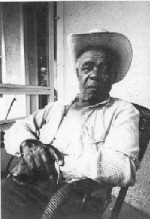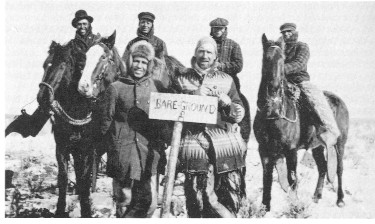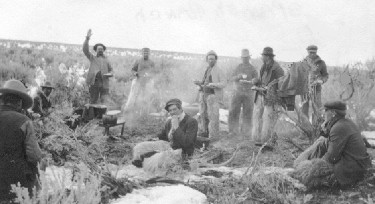HOWARD
HICKSON'S HISTORIES
[Index]
Black Wrangler - Part Nine
Reminiscences of Lawrence Jackson
Edited by Howard Hickson
 Photograph
of Lawrence Jackson by Jonas Dovydenas, Lenox, Massachusetts. With
his permission. Photograph
of Lawrence Jackson by Jonas Dovydenas, Lenox, Massachusetts. With
his permission.
WILLIS PACKER
During the dipping, a young boy by the name
of Willis Packer came along looking for a job. He never cowboyed before,
but wanted to learn. He caught on fast and got to be a good hand as he
was willing. He was better than average as a bronc rider.
A big Mexican by the name of Frank on the
crew was a bully and rode Willis all spring. The kid tried to keep out
of his way but, one day, the Mexican made a mistake. He cornered Willis
in the corral and thought he could whip him. Willis came out fighting and
Frank couldn't believe that one kid was doing so much damage. He thought
it must have been at least five kids. The boss, Cecil Dickson, let it go
on for awhile then stepped in stopped the fracas. Frank wasn't so cocky
after that.
LOST MINE
One day I had the horses on the hill back of
camp, between the Taylor and Ellison properties. I looked down the valley
and saw a car coming. When it got closer I saw it was a high-wheeled Chalmers.
Most folks, nowadays, never heard of that make of car.
It was a old prospector, Jeff Taylor. We all
knowed him. I don't know how he kept that old car going through rocks and
sagebrush. He had a man with him. They flagged me down and the man said
he was Getchell. The name meant nothing to me then, but later it got to
be Senator Noble Getchell.
He said Jeff told him that I had been around
the country a long time, chasing horses and cattle. He asked me if I had
ever run across an old abandoned mine with a homemade windlass and wooden
wheelbarrow close by. He said it was supposed to be the Lost Layton Mine.
"Whether it is, or not, I don't know," Getchell
said, "but his widow has some large nuggets he husband brought in. If you
ever see anything like the place, let Jeff know. He will get in touch with
me and I'll make it worth your while."
Years later, I did run into something like
that, but in a different place. By then, Jeff was dead. Guess I will never
know.
BAD WINTER
During the bad winter of 1948-1949, I was on
the IL trying to feed cattle. For better than thirty days the thermometer
never got above zero. In the daytime it would warm up to five or six below,
then drop down to 35 or 40 below at night. I would haul hay out, but the
cattle wouldn't come out of the brush until afternoon. By that time, the
hay was either blown away or drifted over. I was sure glad when spring
came.

Spanish Ranch cowboys on the first bare ground in the Spring.
Photo courtesy of the Northeastern Nevada Museum, Elko.
HUGH WILLIAMS
A young man from Twin Falls, Idaho, Hugh Williams,
came to work. He was leading a couple of horses out of the corral gate
and got tangled up in the rope. Both horses ran out the gate, dragging
Hugh. They dragged him across a ten acre field. I saw one horse kick him
twice. Them horses dragged him back across the field before he came loose.
I got to him first. He was breathing like a horse choking down. Jim Roberts
run up and pushed me out of the way.
He yelled, "Quick! Let me have him before
he chokes to death!"
He pried open Hugh's teeth and stuck the handle
of his knife in Hugh's mouth and he started breathing okay again. He was
unconscious for three weeks, but came out of it okay and as good as new,
with no after effects at all.

Lunch time on the Spanish Ranch. Photo from the
Northeastern Nevada Museum, Elko.
OPERATION HAYLIFT
We had another bad winter in 1952. Cattle couldn't
even be fed. We had plenty of hay, but some of the smaller outfits didn't
have much. Some, none at all. We would stand in the yard and watch the
big planes circle over the valley and drop hay, four bales at a time, two
out each side. They would circle and drop hay then fly over the mountain
to feed in another valley.
RUNNING DOWN
By now the ranches had quit using horses in
haying and was using tractors. I had never driven one, but the boss said
if you can drive a truck you can drive a tractor. It was a little awkward
at first, but it didn't take long to get the hang of it.
After haying I went back to the buckaroo wagon,
stayed and fed cattle another winter, I was close to retirement age and
knowed I couldn't take it much longer.
That spring, when the cattle was turned out,
I forced myself to go out again. I hadn't been feeling good at all, but
I hated to give up. It took all my energy just getting a saddle on a horse
but I kept going until I couldn't take any longer. I went to Elko to see
a doctor and laid around for a while to rest, then went back to the ranch.
I knew I was imposing on Ellison's good nature, what with the shape I was
in. He was letting me stay on for old time's sake. I appreciated it.
I retired on my pension and moved to Elko.
Once in awhile, one of my old friends stopped by to talk. Getting to be
fewer and fewer of them knocking on my door. There ain't many of us left.
VICENTE BILBAO
One old timer I seen around Elko is Vicente
Bilbao. I first met him in the early Twenties. He rode across the desert
from Oregon and settled in the Independence Valley area around Tuscarora.
That was a ride of over two hundred miles.
Vicente and his brother-in-law had a small
ranch on Lower Jack Creek. I used to ride over the mountain from the IL
Ranch and leave my horse at Vicente's when I took the stage to Elko.
Vicente ran a trap line in the winter with
a pack outfit. He trapped coyotes and bobcats. He was rugged and had to
buck sub-zero temperatures, deep snow and the north wind in the winter.
He usually stopped where night over took him and was always welcome. Them
coyotes and bobcats took a heavy toll of woolies.
When I first met Vicente, his oldest boy,
Dave, was just barely big enough to do light chores. His other son, Tom,
was a small kid crawling around on the floor. When Tommy was big enough
to get around, Vicente taught him how to trap and he got almost as good
as his old man.
Dave made his first trip out on the roundup
wagon with me. He was working for Homer Andrae and Powder River. Dave hired
on as a horse wrangler. Combined, our two outfits had over a hundred head
of horses and a lot them was renegades. They sure kept Dave and me busy.
I see the old man now and then, but, like
me, he has seen better days go by.
Editor: With that, Jackson's narrative ends. He has passed on
like many others of that period but he leaves a legacy of the Old West,
one that was etched in history by the blood, sweat, pain and, yes, even
good times, of those men who loved their work and gave the boss one hundred
percent effort. It took hard men to wrest a living from cantankerous animals
and some bosses who were even more cantankerous than the cattle and horses.
But, they did it.
Howard Hickson
September 21, 2000
©Copyright 2000 by Howard Hickson. If any
portion or all of this article is used or quoted proper credit must be
given to the author.
[Back to Hickson's Histories Index]
|


 Photograph
of Lawrence Jackson by Jonas Dovydenas, Lenox, Massachusetts. With
his permission.
Photograph
of Lawrence Jackson by Jonas Dovydenas, Lenox, Massachusetts. With
his permission.